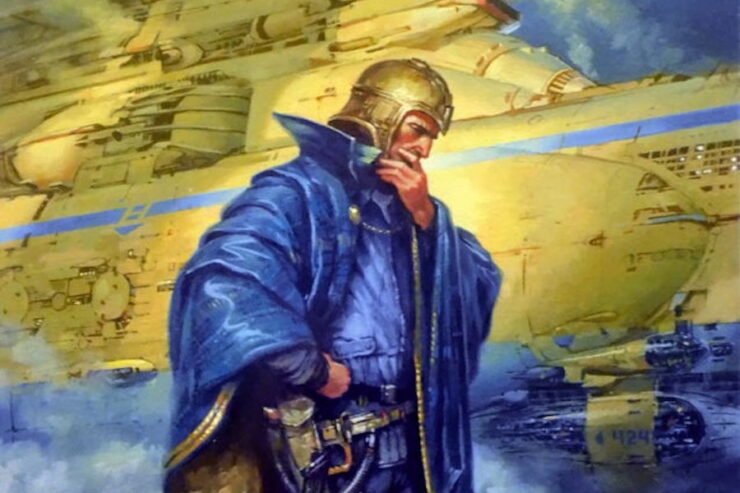
reactormag.com
Five Stories About Aliens Attempting to Govern Humans
Books
Five Books
Five Stories About Aliens Attempting to Govern Humans
Maybe conquering Earth was a bad idea?
By James Davis Nicoll
|
Published on January 6, 2025
Salvage and Destroy cover art by James Gurney
Comment
0
Share New
Share
Salvage and Destroy cover art by James Gurney
Humans being the pinnacle of evolution, our wisdom must be without peer. Nevertheless, occasional missteps—unfortunate electoral choices, methodically destroying the ecosystems on which we depend, New Coke—might trick the cynical into wishing that someone else were in charge…perhaps someone from another planet altogether. This may sound sensible…but consider our unfortunate overlords. What hope have they of governing a species incapable of governing itself?
The following five works are about aliens trying to govern those pesky humans.
“The Gentle Vultures” by Isaac Asimov (1957)
(Collected in Nine Tomorrows) The Hurrians may have only recently encountered humans, but nothing about humans is novel or surprising. Humans are violent, and immoderate—worthy candidates for Hurrian rule. Hurrian non-violence will be no impediment. Earth’s rival nations and their nuclear weapons will soon reduce Earth to a state where Hurrian intervention will appear to be the salvation it is.
That was the plan, at least. Humanity has proven oddly resistant to planetary near-suicide. Baffled as to why humans hesitate to unleash nuclear hell upon themselves when so many previous civilizations gleefully embraced atomic war, the aliens kidnap a human to discover where the infallible Hurrian plan went wrong. The answer will not please the aliens.
The Hurrians have been waiting since the human development of nuclear weapons for us to destroy ourselves. More exactly, they have been waiting fifteen years, which means the story is set in 1960. Perhaps the Hurrians have their own special vice to match the human love of violence: impatience.
Pandora’s Planet by Christopher Anvil (1972)
The Integral Union is adept at incorporating newly contacted worlds into their Union. The process is straightforward: swift military conquest followed by comprehensive reform of the planet to bring it into alignment with Union norms. In Earth’s case, however, conquest took not a week or two but almost half a year. This is an omen the Union should have heeded.
Earth is inferior to the Union in one important respect: they overlooked the breakthrough that leads to faster-than-light travel. In many other respects, human technology is superior to that of the Union. On a being-to-being level, many humans are smarter and far less dedicated to ethical behavior than the other members of the Union. Before the conquest, humans were safely bottled up on Earth. Now, they have been unleashed on the unprepared galaxy.
Usually, if I am not focusing on a particular decade, I like to space my examples out, one to a decade. Please ignore the fact that this fix-up appeared in the 1970s and focus on the fact that, as one might deduce from the “Humans Uber Alles Even If It Appears They Are Not Ubering Over Alles At All” plot, the tale first appeared in the 1950s in John W. Campbell, Jr.’s Astounding.
Unpopular Planet by Evelyn E. Smith (1975)
A novel set in the pampered, over-regulated America of tomorrow. Nicholas Piggot’s rugged good looks have won well-born Bernardine’s heart. This is a mixed blessing, as Nicholas’ rival Hubert Carmichael vows revenge. Hubert is very well connected, more than able to turn dire threat into reality. Nicholas prudently flees.
Nicholas’ talent for spreading chaos in his wake attracts the attention of Earth’s true, but very secret, rulers, the alien Mesiterit. They prudently relocate Nicholas from the methodically gardened Earth to the distant planet Paradise, also stocked with humans. Surely this will put an end to Nicholas’ propensity for disruption! Or rather, provide him with a larger stage on which to be very sexily disruptive.
Readers should note that the author is named E.E. Smith but is not that E.E. Smith. Also, that while Nicholas does stumble from bed to bed, his incessant complaints suggest it’s not as much fun as one might expect, at least for Nicholas.
Salvage and Destroy by Edward Llewellyn (1984)
The Cluster stumbled over Earth centuries ago, found little of interest, and left, taking only a handful of human refugees. It left an orbiting monitor to keep an eye on the barbaric world. To the considerable alarm of the Ult who rule the Cluster, human technology has progressed faster than anyone in the stagnant Cluster could have predicted. Odds are that humans will destroy themselves in the near future. If they do not, and if they get their hands on that monitor, they could reverse-engineer FTL travel and do to the Ult what the Ult did to the now-extinct Drin, back when the Ult were virile barbarians themselves.
Lucian of the Ult commands a starship crewed by the descendants of the human refugees. They are dispatched to dispose of the monitor. We then learn that the handful of humans carried back to the Cluster now number millions, each of whom is immune to the psionic powers on which Ult rule rests. Moreover, it seems the shape-shifting Drin (whom the Ult believed long vanished) have reached Earth and have been hiding there ever since. Furthermore, a cabal in the Cluster took steps to sabotage the mission, inadvertently preventing Lucian from sharing anything he has learned with the Cluster. Nothing for it, therefore, but for Lucian to throw his lot in with the humans.
Unfortunately, Llewellyn died soon after this novel was published, so if he planned to return to the Cluster to show whether the ruling Ult ever comprehended that their supposed subjects had de facto replaced them as the governing class on many outlying planets, he never had the chance to do so.
Usurpation by Sue Burke (2024)
Humans were helpless to resist invasion by the extraterrestrial Rainbow Bamboo. In part this was because humans didn’t comprehend that they were being invaded by a seemingly harmless exotic plant. Mostly it was because humans were preoccupied with many far more apparent pressing challenges. By the late 3rd millennium, humans number a bare quarter billion and the decline shows little sign of stopping. Left to themselves, humans will not save themselves.
Levanter and Levanter’s Rainbow Bamboo kin are determined to provide humans with the guidance that humans so sorely require. This will be a challenge, as Rainbow Bamboo lack hands as well as mobility. They are, after all, the plants suggested by their name. Nevertheless, the alien plants don’t lack for cunning. Success is assured… unless humans import another invasive species that is destructive to humans and Rainbow Bamboo alike. Which of course the humans do.
It’s a good thing for humans that the Rainbow Bamboo choose to look out for other species, because the humans in this novel don’t appear to have any benefits to the Bamboo other than providing nutritious mulch.
Five stories barely scratch the surface of alien conquerors discovering too late why conquering Earth may be a bad idea. Feel free to regale us with works unnamed above. (Bearing in mind that I might have omitted them because they were mentioned in earlier essays.)[end-mark]
The post Five Stories About Aliens Attempting to Govern Humans appeared first on Reactor.














